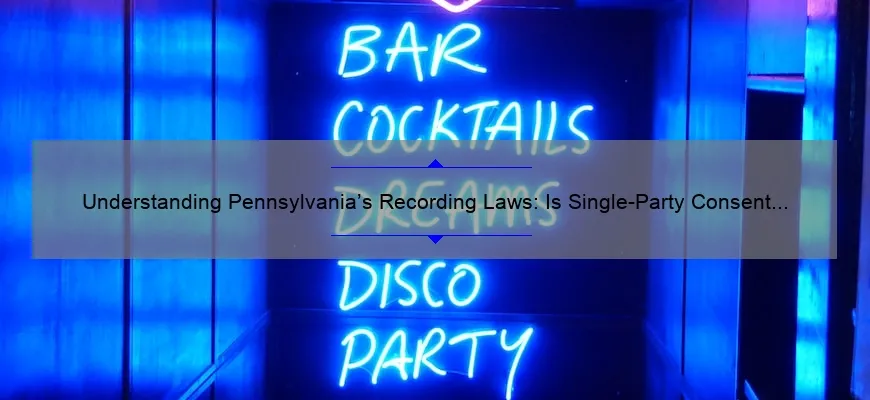Short answer: Is Pennsylvania a single party consent state?
Yes, Pennsylvania is a single party consent state which means that only one person in a conversation needs to know that it is being recorded. Recording without the consent of all parties may result in criminal and civil liabilities. However, there are some exceptions to this rule such as when recording conversations with law enforcement officials or during public gatherings.
How is Pennsylvania a single party consent state?
Pennsylvania is a state with a long and rich political history, home to some of the most iconic events in American democracy. As one of the original 13 colonies that formed the United States, Pennsylvania has always been a key player in shaping the nation’s political landscape.
In recent years, however, Pennsylvania has gained notoriety for another reason – as a single-party consent state.
So what exactly does it mean to be a single-party consent state? In simple terms, it means that individuals are allowed to record conversations without obtaining permission from all parties involved.
This may seem like an infringement on privacy rights, but there are certain exceptions and restrictions designed to ensure that this power is used responsibly.
For example, it is illegal to record conversations where you are not physically present or if you do not have specific authorization from one of the parties involved. Additionally, recordings cannot be made with malicious intent or for commercial gain.
As with any law related to privacy and surveillance, opinions on Pennsylvania’s status as a single-party consent state vary widely. Some argue that it infringes on individuals’ right to privacy and creates an environment of mistrust and suspicion. Others maintain that it allows for greater accountability and transparency in personal and professional interactions.
Despite these differing viewpoints, there can be no doubt that Pennsylvania’s status as a single-party consent state has far-reaching implications for both citizens and businesses alike. Whether you believe it is an essential tool for safeguarding individual rights or an unnecessary intrusion into personal lives, one thing remains clear – this controversial law will continue to shape political discourse in the Keystone State for years to come.
Is Pennsylvania a single party consent state step by step: guidelines for recording conversations
If you’re wondering whether Pennsylvania is a single party consent state when it comes to recording conversations, the answer is yes. This means that as long as one party in the conversation consents to being recorded, it’s legal. However, there are some guidelines you should follow if you plan on recording conversations in Pennsylvania.
1. Determine if the conversation is private: In Pennsylvania, it’s illegal to record conversations that take place in private spaces without consent from all parties involved. Private spaces can include someone’s home or office and other spaces where people have a reasonable expectation of privacy.
2. Get consent: If you want to record a phone call or a conversation in person, make sure everyone involved is aware that they’re being recorded and give their consent. You don’t need written permission, but having proof of verbal consent is helpful just in case any issues arise later.
3. Be mindful of federal laws: Even though Pennsylvania allows for single-party consent, federal law requires two-party consent for certain situations such as recording phone calls that cross state lines.
4. Respect others’ privacy: Make sure that your recording doesn’t capture any information or statements from people who are not part of the conversation.
5. Stay ethical: Just because something is legal doesn’t mean it’s always ethical to do so. Consider whether recording a conversation could be seen as manipulative or betraying someone’s trust before hitting the record button.
In summary, Pennsylvania is indeed a single party consent state when it comes to recording conversations. However, it’s important to respect others’ privacy and obtain consent before hitting record. Ultimately, staying mindful of both legal and ethical considerations will help ensure that you stay within bounds while still getting what you need out of your recordings.
Pennsylvania is a two-party consent state when it comes to recording conversations. This means that all parties involved in a conversation must consent to being recorded. This consent must be given either explicitly or implicitly for the recording to be considered legal.
Explicit consent means that each party must be made aware that they are being recorded and give their direct permission for the recording to take place. Implicit consent can exist in situations where the party being recorded should reasonably expect that the conversation may be recorded, such as in public places or during telephone calls where a notice of recording is played.
There are exceptions to this rule, however. Recording conversations without obtaining explicit or implicit permission from all involved parties is permissible in the following circumstances:
1) If one of the parties involved has given their prior consent to being recorded
2) If one party has reason to believe they are in danger and need evidence of a threat
3) If a law enforcement official is making the recording as part of an official investigation
It’s essential to note that while these exceptions may apply, it’s still important to understand how Pennsylvania’s wiretapping law works before moving forward with any recordings.
In summary, Pennsylvania is not a single-party consent state; it’s a two-party consent state with limited exceptions for recordings without explicit permission from all involved parties. Always consult with a lawyer familiar with Pennsylvania’s wiretapping laws before actively engaging in any form of covert or overt recording activities.

